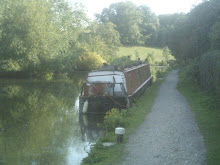The text below was written by me for NABO news and published in the July 2013 issue. Thought I would post them here too given Narrowboatworld's proposed poll on overstaying charges. This week has also seen news that CRT are planning to try implementing this system in a few places.
We get the impression that more than a few people question why NABO, some would say obstinately, all but stands alone among the established waterways organisations by still opposing a number of issues concerning licence terms and conditions and enforcement issues proposed by CRT. As reported in last NABO News we are taking further legal advice on a number of matters and following our subsequent Council meeting (May 2013) we reviewed the matter and felt we should re-state our view.
The matter is in essence really simple. We don’t deny that when it comes to enforcement issues CRT has a huge problem and needs a different approach to that which has been tried in the past. Where we remain concerned is that the apparent imperative to do something is leading CRT down a path of pursuing new rules and regulations that are not sustainable, which risk being ripped up sometime in the future because they are legally unsound.
Of course ultimately it is for a Court to determine that legality, if and when such a sanction is implemented and also in turn challenged, but the history of this issue also cannot be swept aside by denial of the facts.
However you dress it up the fact is that proposals for overstaying charges and other penalties are in reality intended as fines and deterrents. Many of the measures now being implemented following the recent paper to Trustees and the CRT Council contain the same fundamental elements of enacting financial penalties for certain behaviour. This represents a fundamental change to the rules of boating on CRT waters if it goes ahead: And it seems that the CRT Trustees and Officers are indeed determined to go ahead.
In the late 1980’s BW clearly did not think that its existing powers including the 1962 Transport Act could be used to extend its powers to this extent and so launched the Waterways Bill to seek, among others, such powers. Parliament spent many months sifting through the evidence for and against and then declined to grant the additional powers. What has changed legally since that time? We say nothing.
A similar story can be told about imposing more specific requirements for Continuous Cruising. ‘Continuous Cruising’ is of course not a term that is mentioned in the 1995 Act, but is what we have come to call the right enshrined in the Act not to be required to have a home mooring providing you move every two weeks or more frequently. Parliament expressly left the definitions very loose because it heard copious evidence about how any more prescriptive formula could not be applied fairly, consistently or effectively. The fundamental issue then is the same as it is now.
This was over twenty years ago so isn’t it time to move on? Well we still say no. The Waterways Acts are not just there to empower BW and its successor CRT, but also among other things to protect boaters’ rights to navigate and moor for reasonable periods in the course of doing so.
Many boaters on the forums and some national waterways organisations whose members include boaters, who support CRT making these moves of course say (among other things), “ it won’t affect me – I play by the rules”. We think that is wishful thinking. Although we accept parking charges as a reality of modern life, the fact is that all these schemes are specified by primary and secondary legislation, to ensure that they are administrated clearly and fairly. Charges are by and large regulated by secondary legislation and not cumulative. Despite all that, things do not always happen as they should and the law and raft of regulations offer transparent appeal mechanisms to give motorists re-dress when appropriate. These rights are invoked hundreds of times a day to successfully appeal unfair or incorrectly issued fines and charges. By the same token any overstaying and other fines introduced by CRT will likewise have an error rate and sooner or later these matters will if implemented be challenged.
Apart from the fundamental concerns about the overall legality of some of what is being proposed, we are also determined to ensure that NABO members, when potentially faced with such errors in the future, have access to robust advice on ways to challenge such charges when, as will inevitably happen, CRT makes mistakes.
Saturday, 17 August 2013
Subscribe to:
Post Comments (Atom)


Which is why I'm still a member of NABO
ReplyDelete